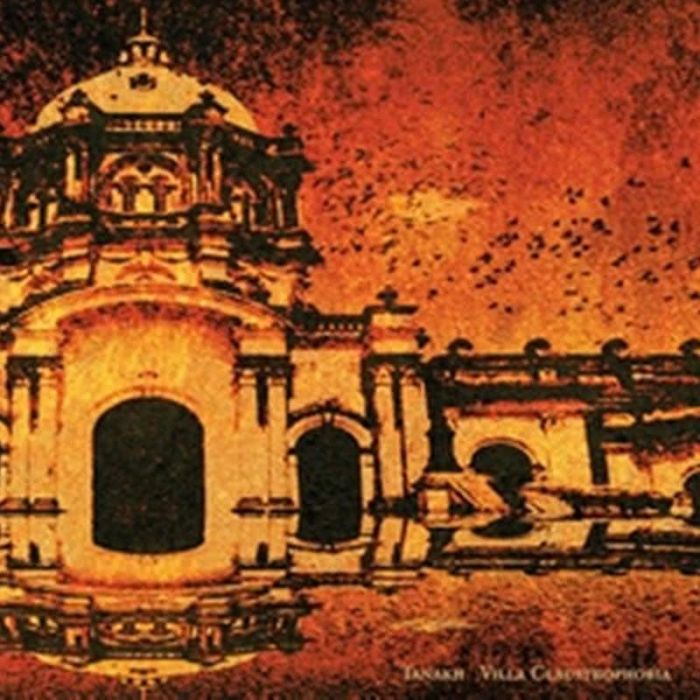Villa Claustrophobia by Tanakh (Review)

Villa Claustrophobia might be Alien8 Recordings’ most accessible recording to date (at least, according to their website) and I’m inclined to believe them. The Canadian label might best be known for putting out a wide range of experimental/avant-garde artists, from Keiji Haino and Acid Mothers Temple to David Kristian and Merzbow. While Villa Claustrophobia is probably nowhere near as bombastic as Acid Mothers Temple’s Electric Heavyland or Masonna’s Frequency LSD, that should not be construed as a slight against this album’s ability to overwhelm the listener.
Tanakh is the project of Jesse Poe, a Virginia native with a predilection for Indian drones, Old English folk tunes, and Appalachian atmosphere — all in all, a stunning combination of Old and New World, East and West. It almost sounds like a student project of sorts, but there’s something deeper here than mere academic interest.
For starters, Poe comes from a long line of musicians, including a great-grandfather who penned country ballads. One can imagine the ghost of his ancestor’s songwriting permeating these pieces. What makes Villa Claustrophobia so effective is just how song-like these arrangements are; no matter how psychedelic or atmospheric it gets, no matter how thick the drone gets laid on, the album never runs the risk of drifting off aimlessly. At the same time, the album is improvisational enough to keep things from becoming staid and predictable. You’ll probably still be intrigued by the rabbit trails these songs take, especially on more formless numbers like the aptly titled “Prayers In The Pavilions of Other Men’s Dreams.”
“Stereognosis” is a fine example of this, with Poe’s deep voice and sparse acoustic guitars serving as the song’s core, while all manner of Middle-Eastern drones and strange, ethereal noises swirl about like hashish and incense. This track bleeds into “Tells,” where the atmosphere takes over briefly. Shifting guitar tones swirl about, constantly in danger of being crushed by their own reverberations, as a deep, subterranean bass pulse keeps everything from completely breaking loose.
“Gently Johnny” is the finest example of Tanakh’s arrangements, the best merger of Tanakh’s numerous influences and sounds. Although its roots are as an Old English folk ballad, Poe slowly transforms it into something far more dream-like through guitar sounds, mournful strings, horns, and Nirmal Bajekal’s otherworldly vocals. The piece gently becomes a kaleidoscope of sounds that seem as familiar as they are alien. In all, an absolutely stunning track that is psychedelic as all get out, but never any less emotionally affecting thanks to Poe’s rich vocals and the song’s sensual lyrics.
While Tanakh is Poe’s project, it’s far from a one-man deal. For starters, a number of luminaries join him in creating the album’s deep sounds: Mick Turner (Dirty Three), Jessica Billey (Lofty Pillars), David Lowery (Cracker), Ned Oldham (Palace), and Nirmal Bajekal (a former member of Ravi Shankar’s band, and who provides the spectral vocals that bookend the album). Together, they bring a diverse array of instruments to the table, ranging from “traditional” ones such as guitars, bass, and trumpets to harmoniums, tamboras, theremins, and saws. And it should come as no surprise that people responsible for recordings from the likes of Slint, Beck, Labradford, and Sparklehorse worked behind the scenes.
Of everything in Alien8’s catalog to date, Tanakh is most comparable to the “folk actuelle” of Molasses. As much as I’ve liked Molasses’ recordings (which are quite excellent in their own right), I find Tanakh more inviting and involving. For one thing, Poe’s vocals require less acclimation than Scott Chernoff’s do. Also, the songs themselves are not quite so melodramatic or overwrought. Rather, Tanakh’s music feels much freer, thanks to the heavy improvisational element, and more exotic, due to the Indian and Middle-Eastern influences.
I also detect many similarities to The Iditarod’s The Ghost, the Elf, the Cat and the Angel, especially in the way that Poe takes thick, heavy drones and incorporates them within more rustic song arrangements. That being said, it certainly didn’t surprise me to find out that Poe had helped record The Iditarod’s album.
Whatever the connections and comparisons might be, the fact remains that Tanakh has crafted an impressive debut album, one with all of the intangibility of a fever-induced delirium, the expanse of an Arabic desert, the mystery of old Appalachian forests, and the beauty of a religious experience. If you’re a fan of any of the aforementioned artists, David Eugene Edwards’ work in Sixteen Horsepower and Woven Hand, or even The Denver Gentlemen, Villa Claustrophobia is an album well worth check out.